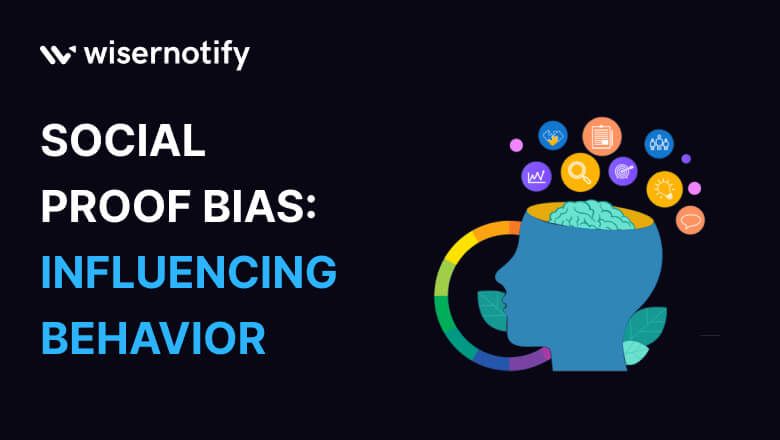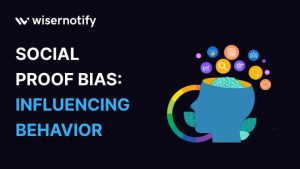In a world driven by the opinions of others, our choices often hang in the balance of social influence.
According to a study by Robert Cialdini, renowned psychologist and author of “Influence: The Psychology of Persuasion,” a staggering 75% of people admit that social proof affects their decision-making process.
Build trust & FOMO
Highlight real-time activities like reviews, sales & sign-ups.
What is Social Poof Bias?
Social proof bias is the propensity for people to adopt the behaviors or viewpoints of a group because they believe that the group’s behavior represents the right or popular choice. This bias is rooted in the psychological phenomenon of social proof, where individuals look to others to determine the appropriate behavior, especially in ambiguous or uncertain situations.
The desire to fit in or follow perceived popular opinion can sometimes lead individuals to make decisions that may not be in their best interest or to overlook evidence that contradicts the group’s actions or beliefs.
The Psychology Behind Social Proof Bias
As human beings, we are inherently social creatures, constantly seeking connection and acceptance within our respective communities. This innate desire for social interaction significantly shapes our choices and behaviors, influenced by the power of social proof.
The Influence of Peers
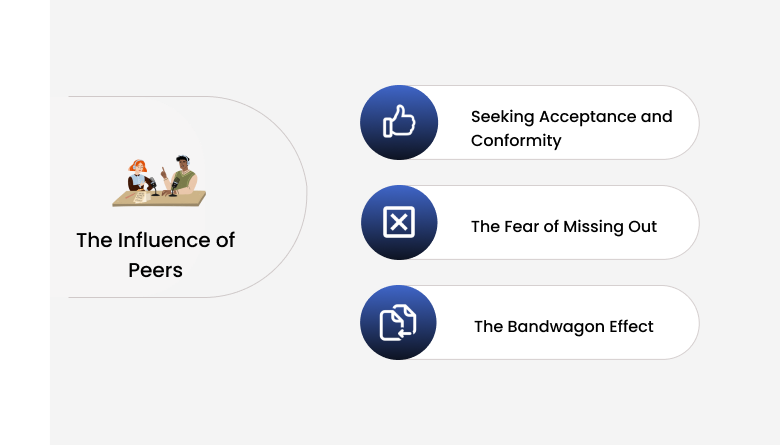
Seeking Acceptance and Conformity
Joining a Trendy Fitness Class Imagine a group of friends enthusiastically sharing their fitness journeys, complete with impressive transformations and exciting stories. As the conversations continue, you start feeling excluded and curious. Intrigued by their shared experiences, you join the trendy fitness class they’ve been raving about. In doing so, you hope to improve your fitness and feel a part of their tightly-knit group.
Buying a Specific Brand of Clothing, You are surrounded by a social group that embraces a specific clothing brand. Their impeccable fashion sense and confident demeanor leave you yearning for a similar sense of belonging. As a result, you decide to purchase clothing from the same brand, aligning your appearance with your peers. By doing so, you hope to enhance your acceptance within the group and project a sense of shared identity.
The Fear of Missing Out (FOMO)
Attending Events or Parties You receive numerous invitations to events and parties, but due to your prior commitments or personal reasons, you decline most of them. However, you notice that your peers seem to be constantly attending these social gatherings, sharing their memorable experiences, and forming stronger bonds amongst themselves. Feeling fear of missing out, you rearrange your schedule and prioritize attending these events to avoid feeling left out and disconnected from your social circle.
Participating in Online Challenges or Viral Trends You stumble upon a viral online challenge that has gained immense popularity. Your social media feed is flooded with videos and posts of your friends and acquaintances participating in this trend. Although initially skeptical, the fear of missing out (FOMO) starts creeping in. To stay connected and avoid feeling excluded, you jump on the bandwagon and participate in the challenge, documenting your experience for others to see.
Also See: 10 Best FOMO Marketing Examples To Boost Sales
The Bandwagon Effect
Example 1: Choosing a Busy and Popular Restaurant You’re planning a special dinner with friends and want to select a restaurant that guarantees a delightful experience. As you seek recommendations, you consistently hear about a particular restaurant that is always busy and enjoys immense popularity. Even though you haven’t personally tried it, the positive reviews and the idea of being part of the “in-crowd” influence your decision. You choose the restaurant, trusting that the majority’s opinion aligns with your own desires.
The Authority Influence
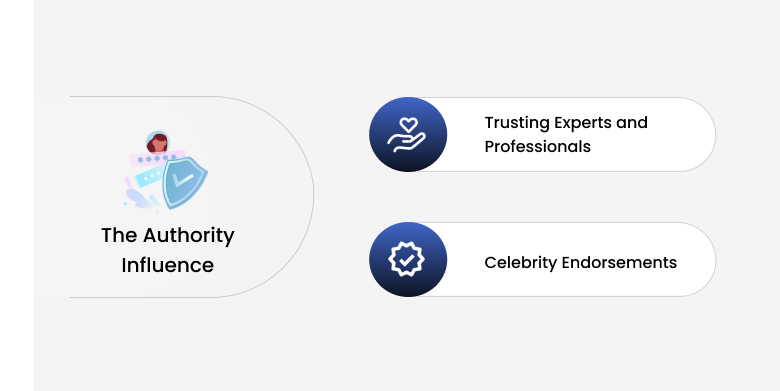
Trusting Experts and Professionals
Imagine you’re trying to lead a healthier lifestyle and you’re looking for guidance on what to eat. You come across a renowned nutritionist who has years of experience and a wealth of knowledge in the field. Their expertise and qualifications make them authority figures in the realm of nutrition. Intrigued, you decide to follow their advice and adopt the healthy diet they recommend.
In another scenario, you find yourself in need of financial advice. The complexities of investments and financial planning can be overwhelming, so you seek the help of a financial advisor. This individual deeply understands the financial market and can provide expert guidance based on their years of experience. You trust their expertise and rely on their advice to make informed investment decisions.
Celebrity Endorsements
Now, imagine you’re browsing a department store, looking for a new perfume. As you explore the fragrances, you notice one endorsed by a popular celebrity. This celebrity has a significant fan base, and their endorsement carries weight in the public eye. Intrigued by their recommendation and hoping to capture a bit of their allure, you purchase the perfume.
Similarly, you’re scrolling through your social media feed and come across an influencer promoting a skincare product. This influencer has a massive following and is known for their flawless complexion. They rave about the benefits of the skincare brand and claim it has transformed their skin. Intrigued by their glowing recommendation, you try the product yourself, hoping to achieve similar results.
Build trust & FOMO
Highlight real-time activities like reviews, sales & sign-ups.
The Wisdom of the Crowd
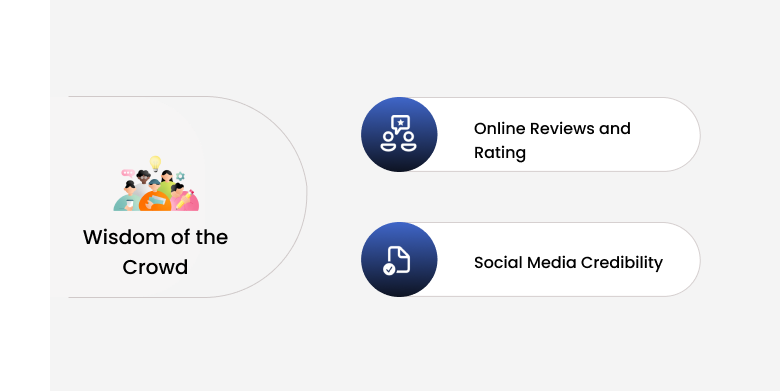
Online Reviews and Ratings
Imagine you’re planning a vacation and searching for a hotel in a new city. You stumble upon a travel website that provides reviews and ratings from previous guests. You notice one particular hotel with overwhelmingly positive reviews and a high rating. Intrigued by the glowing feedback, you decide to book your stay at that hotel, trusting the crowd’s wisdom and believing that others’ positive experiences will also translate into a delightful stay for you.
In another scenario, you’re browsing through an online marketplace, looking to purchase a new gadget. You notice a product with numerous positive customer reviews as you explore the options. These reviews detail the product’s features, performance, and overall satisfaction. Convinced by the collective praise from fellow consumers, you decide to purchase, confident that the product will meet your expectations based on the crowd’s wisdom.
Social Media Credibility
Let’s consider social media’s influence on the crowd’s wisdom. Imagine you’re seeking answers to a complex question or a specific area of expertise. You turn to a platform like Quora, where individuals can ask questions and receive answers from a community of users. As you search for your question, you notice an answer that has received numerous upvotes and positive comments. Recognizing the credibility of the responder, as indicated by the support and validation from other users, you decide to trust their answer, believing it to be reliable and accurate.
Similarly, individuals can showcase their skills, experiences, and achievements on professional networking platforms like LinkedIn. As you explore profiles and come across someone with numerous connections, endorsements, and recommendations, you perceive them as credible and knowledgeable in their field. This credibility influences your perception of their expertise and may lead you to engage with them or seek guidance.
In both of these scenarios, the crowd’s wisdom plays a significant role in shaping our decisions. We rely on the collective experiences, opinions, and credibility of others to guide us in making informed choices. However, it is crucial to approach these influences critically, considering the authenticity and diversity of the crowd’s opinions. By doing so, we can navigate the crowd’s wisdom effectively and ensure that our decisions align with our values and needs.
Also Read: Nudge Marketing Playbook (Checklist, Tools and Examples)
